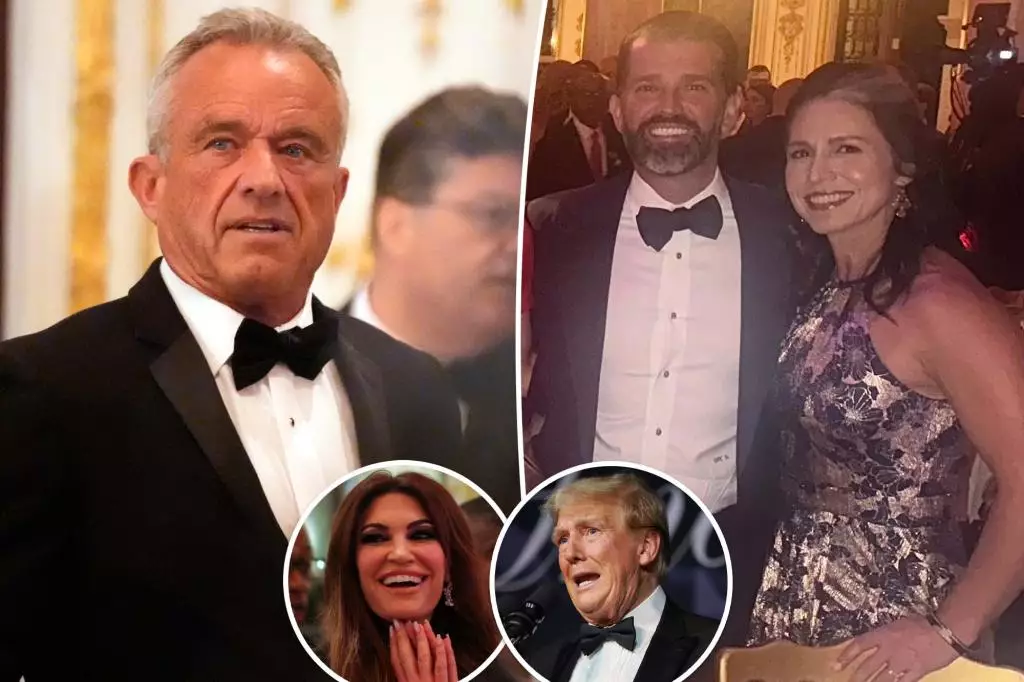On a vibrant Thursday night in Mar-a-Lago, a star-studded gathering took place that could shape the future of the Republican Party. Donald Trump, having recently been re-elected as the party’s leader, is meticulously assembling his cabinet, and two of the most controversial figures associated with his administration—Robert F. Kennedy Jr. and Tulsi Gabbard—were spotted attending a lavish gala. Their presence at this posh Palm Beach venue was more than just a social gathering; it served as a clear indicator of their anticipated roles within the Trump administration.
Kennedy has been selected to lead the Department of Health and Human Services, while the former Democrat Gabbard is poised to take charge of national intelligence. Their nominations signal a strategic shift within the Trump administration, blending traditional Republican ideals with a more eclectic mix of viewpoints. This choice could alter the party’s trajectory, particularly as it seeks to reconnect with diverse voter bases.
The event also had a prominent display of political and media figures, including Donald Trump Jr., his fiancée Kimberly Guilfoyle, and Tucker Carlson, who sat at the same table as Kennedy and Gabbard. The gathering was not merely a celebration; it was a networking opportunity for those in attendance, unveiling a fusion of power and influence, which could be advantageous for all involved.
Alongside notable names, such as mega-donor Omeed Malik and Kennedy’s family members, the group seemed to endorse a new political era that may redefine allegiances within the party. With the presence of high-profile guests, the atmosphere buzzed with anticipation for the announcements that Trump teased would follow. The evening’s importance was punctuated by celebrity endorsements, with Sylvester Stallone introducing Trump as a “second George Washington,” suggesting that the public’s perception of Trump remains widely venerated among his admirers.
The phrasing used by Stallone, comparing Trump to one of the nation’s Founding Fathers, exemplifies how celebrity culture intertwines with politics, ultimately elevating individual figures to mythical status. This phenomenon raises questions about the role of popular media in shaping political narratives. Celebrities have the power to influence public opinion, and as such, their role in political gatherings cannot be overlooked.
While the details of what was served at dinner remain obscure, the implications of the evening extend beyond the culinary experience. Those in attendance come from varied backgrounds, each bringing their unique perspectives to the table—and the dinner served was symbolic of that blend. The fusion of diverse agendas may lead to an unpredictable yet fascinating trajectory for both domestic policies and international relations.
As everyone closely monitors the outcomes of this gala and the subsequent cabinet picks, the political landscape appears to be undergoing a fundamental shift. Trump’s administration may be attempting to reposition itself as more inclusive, merging conservatism with progressive ideas— a daring strategy that could either revitalize the party or fracture it further. As the pieces of this complex puzzle continue to be revealed, the public remains vigilant, curious about what tomorrow holds for American politics in the post-Trump era. The implications of these choices resonate far beyond a single night in Mar-a-Lago, foreshadowing significant shifts for the Republican Party and the nation at large.

Leave a Reply